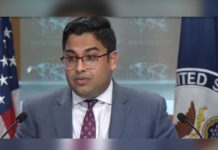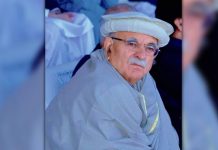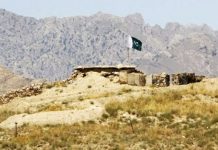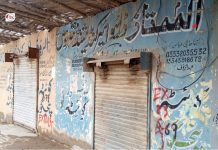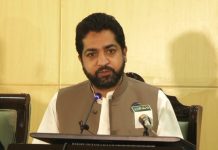Author: Fareed Baloch
In the district of Kech, Balochistan, the death of schoolteacher Abdul Rauf has ignited widespread concern. Allegedly murdered over religious accusations, Rauf’s demise symbolizes the tension escalating in a region historically known for its secular values.
Rauf was reportedly on his way to a ‘religious jirga’, an assembly convened to address allegations against his religious standing when he was killed. The specifics of these allegations are yet unclear, but the deadly outcome is undeniable.
Reactions
Immediate reactions from various quarters have been strong. BNM’s human rights department, Paank, remarked on the severity of the situation, raising concerns about the establishment of death squads by the Pakistan Army and the rise of religious extremists in Balochistan.
Baloch activist, Niaz Baloch, commented on the historic secularism of Baloch society, expressing distress at Pakistan’s alleged use of religious extremism to distract from the Baloch nationalist cause.
Mahrang Baloch, a human rights activist, reflected on the broader implications, “The state-sponsored killing of a Baloch youth for religious motives introduces a new challenge to our secular society. Yet, this ‘religious discourse’ from the state isn’t new. The state has, for years, used the ‘Mullah Death Squad’ to suppress Baloch political consciousness.”
Dr Naseem Baloch, Chairperson of the Baloch National Movement (BNM) lamented on twitter, “The killing of Abdul Rauf Baloch in Kech is a tragic and despicable act. For years, we have been cautioning about Pakistan’s use of religion to oppress the Baloch nation, but the Baloch have continued to uphold their secular values.”
Journalist Kiyya Baloch provided a historical context: “Madrassas were introduced in Makran to counter nationalist sentiment. This led to a spread of such institutions across Panjgur, Kech, and Gwadar.
Ali Jan Maqsood, another journalist from the region, added, “Reports suggest that Abdul Rauf was headed to a ‘religious jirga’ to defend his religious beliefs before his untimely death. Such incidents spotlight the ongoing genocide in Balochistan.”
The Baloch Yakjehti Committee (BYC) vehemently criticized the ascent of religious personalities like Mufti ShahMeer, accusing them of exploiting blasphemy claims for personal benefits, thereby having undue influence over educational establishments. They cautioned against such state-backed religious maneuvers, emphasizing the potential of further dividing the Baloch populace on religious grounds.
Turbat Civil Society lamented the misuse of blasphemy allegations in Turbat, culminating in Abdul Rauf’s tragic death. They highlighted the district administration’s inaction, underlining Makran region’s historical religious harmony.
Historical Context
Balochistan has always held its secular identity in high regard. Historically a multi-ethnic territory, the region has been a beacon of coexistence, where diverse tribes, customs, and beliefs have coexisted seamlessly for generations. The Baloch have always prided themselves on their secular culture, even amidst the backdrop of a nation steeped in religious diversity.
However, this harmonious tapestry has started showing signs of strain in recent decades. A notable example is the 2014 assassination of Zahid Askani, founder of The Osis School in Gwadar. His killing by suspected state-sponsored religious extremists marked the dangers educators and nationalists in the region face.
The Religious Extremist Connection
Today, there’s growing apprehension about state powers pushing a religiously polarized identity, as evidenced by incidents like Abdul Rauf’s assassination. Such events are increasingly seen as manifestations of a dangerous trajectory. This change was set in motion, particularly after the US invasion of Afghanistan in 2001, with Islamist groups from the neighboring country seeking refuge in Balochistan and gradually influencing its socio-religious fabric.
Moreover, analysts note that the state’s counter-insurgency strategy in Balochistan has hinged on promoting religious fundamentalism as a tactic to counter pro-independence nationalist sentiments. This strategy has not been without consequences. While it was intended to counteract the Baloch nationalist sentiments, it inadvertently bolstered religious intolerance and sectarian conflicts. Today, religious and ethnic minorities such as Hazaras, Hindus, and Zikris bear the brunt of this strategy’s adverse effects.
This changing landscape has also made the region a conducive environment for extremist factions. Groups like TTP find fertile ground to sow their ideologies and expand their influence, challenging the traditionally secular ethos of the region.
This broader trend towards radicalism has individual faces. One name that frequently emerges is Shafiq Mengal, a state-sponsored ‘death squad’ leader and founder of Musallah Difah Tanzeem (MDT). Mengal, who established MDT in 2008, is believed to have ties to religious extremist groups.
His ties reportedly connect to a Deobandi Seminary in Karachi and extremist factions, such as Lashkar-e-Taiba. As the leader of a notorious ‘death squad’, his reign has been marked by violence against nationalists and tribal adversaries. However, the structures supporting him, such as the ISI and militants of the so-called Islamic State and Lashkar Jhangvi Al-Almi supposedly trained in Wadh camps under his leadership and the ISI’s oversight, are of greater concern.
Further complicating matters are individuals like Shahmeer Aziz, believed to be involved in Rauf’s murder. Aziz spearheads religious extremist groups, often under the guise of religious seminaries. These institutions propagate specific religious doctrines and advance the military’s objectives, demonstrating a dual approach by the state to maintain control over Balochistan.
Today, as Balochistan confronts a crucial juncture, the intertwining of state influence, death squads, and religious extremism threatens its time-honored secular fabric. The future of the Baloch’s long-held values remains uncertain.











